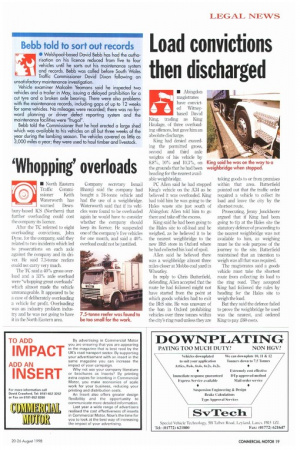Load convictions then discharged
Page 21

If you've noticed an error in this article please click here to report it so we can fix it.
• Abingdon magistrates have convicted Witneybased David King, trading as King Haulage, of three overloading offences, but gave him an absolute discharge.
King had denied exceeding the permitted gross, second and third axle weights of his vehicle by 8.8%, 10% and 10.3%, on the grounds that he had been heading for the nearest available weighbridge.
PC Allen said he had stopped King's vehicle on the A34 as he believed it was overloaded. King had told him he was going to the Hales waste site just south of Abingdon: Allen told him to go there and take off the excess.
King said he had been going to the Hales site to off-load and be weighed, as he believed it to be the nearest weighbridge to the new BliS store in Oxford where he had collected his load of spoil.
Allen said he believed there was a weighbridge almost three miles closer at Mobbs coal yard in Wheatley.
In reply to Chris Butterfield, defending, Allen accepted that the route he had followed might not have started from the point at which goods vehicles had to exit the BhS site. He was unaware of the ban in Oxford prohibiting vehicles over three tonnes within the city's ring road unless they are
6 6
taking goods to or from premises within that area. Butterfield pointed out that the traffic order required a vehicle to collect its load and leave the city by the shortest route.
Prosecuting, Jenny jonckheere argued that if King had been going to tip at the Hales site the statutory defence of proceeding to the nearest weighbridge was not available to him, as weighing must be the sole purpose of the journey to the site. Butterfield maintained that an intention to weigh was all that was required.
The magistrates said a goods vehicle must take the shortest route from collecting its load to the ring road. They accepted King had followed the rules by heading for the Hales site to weigh the load.
But they said the defence failed to prove the weighbridge he used was the nearest, and ordered King to pay £60 costs.








































































































